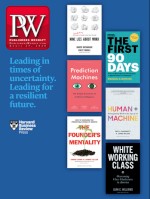What Is an Editor?—a volume of curated correspondence to and from Random House’s first great editor, Saxe Commins—has held an honored place on my shelf for 18 years. It came from Bob Loomis, shortly after I signed with him to write a biography of Bennett Cerf, the RH cofounder who hired Saxe in 1933 and Bob in 1957, a year before Saxe died.
Though I’d worked in London as an editor, and later at Publishers Weekly, Bob, in his subtle way, knew the book would open my eyes to the golden editing and publishing world created by Cerf and Donald Klopfer, who founded RH with him. It was the kind of work—and the calling—that Bob himself embodied, as it would be my fortunate experience to discover.
In 2002, for RH’s 75th anniversary, Bob helped put together a commemorative volume, Dear Donald, Dear Bennett, of wonderful WWII correspondence between the partners. I read the galley, interviewed him, and wrote a long piece for PW. End of story, but not quite.
I was spending that year at Columbia University on a fellowship, and those letters, among other RH papers, are housed there. Poking around, I was captivated, and so I wrote a book proposal. I sent it to Bob for advice; two days later, he phoned to say he intended to publish my book.
Bob owed so much to Bennett and Don—he loved those men—and at first he spoke of the book as “a celebration.” But, though I’d never written a biography, I wanted it to do more than celebrate. Once Bob recognized what I hoped to achieve, he adjusted his expectations, and—with understanding and faith—my deadline. Repeatedly.
Voluminous research followed; chapters were written and read. We’d discuss them over lunches—these required leaning in, literally, since Bob spoke so softly, and every word counted. “Just keep writing,” he’d say, but eventually the refrain became: “It’s going to be too long—just keep writing.”
As encouragement, he spoke of Neil Sheehan, who’d won a Pulitzer and a National Book Award for his masterpiece on Vietnam, A Bright Shining Lie. Was it 14 years of struggle and obstacles before Sheehan emerged triumphant? Bob had also taken my fellow PW alum, Lisa See, into his fold, helping her flourish anew. And he’d stood by Edmund Morris when Edmund inserted a fictional narrator into Dutch. “He was so frustrated; it made the book work. It’s still the best book on Reagan,” Bob said proudly, only two months ago.
It was a shock when, in 2011, he retired at age 85 and Jonathan Jao, 50 years younger, took over my book. Two years later, Jonathan went to Harper. RH proved extraordinarily patient—the extensions kept coming—but I needed an editor.
Bob and I both had places in Sag Harbor, N.Y. We’d stayed in touch. One day, he said to me, “What if I start reading again?”
That was hardly the half of it. Now the famous Robert Loomis—he of cryptic check marks and comments, and in his late 80s—started as my unofficial unpaid editor, grappling with the too-long script as I was writing its last third. Once I’d finished the draft, he began at the beginning again. In meetings at his home, and on the phone, we went through chapters, line by line—I was his last author.
Beneath the mild demeanor Bob could be really tough. He recounted how he’d gotten Maya Angelou to write I Know Why the Caged Bird Sings: after she’d refused his suggestion several times, he’d told her “she was right, it would be too hard.” Of course, Angelou then rose to the challenge.
He’d say to me, “You write these essays for PW and the Bookseller—why can’t you bring that concision to the book?” (It had its effect.) He taught me so much. He was always there, and his wisdom on the page knew no bounds. When he judged a passage “good” or a chapter “finished,” it was praise indeed.
Despite his great age, it seemed Bob would go on forever. Alas, on April 19, at age 93, he was gone. He was one of the really important people in my life and in the lives of so many whom he guided, inspired, and consoled, and there is no consoling us now. But what remains is the work he believed in fiercely and the standards he set. I know in my head—and in my heart—the answer to “what is an editor?” now.
Gayle Feldman has written for the Bookseller and Publishers Weekly for many years and is completing a biography of Bennett Cerf for Random House.



 Volume 267
Issue 17
04/27/2020
Volume 267
Issue 17
04/27/2020





